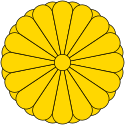1942 Japanese general election
| ||||||||||||||||||||||||||||
All 466 seats to the House of Representatives of Japan 234 seats needed for a majority | ||||||||||||||||||||||||||||
|---|---|---|---|---|---|---|---|---|---|---|---|---|---|---|---|---|---|---|---|---|---|---|---|---|---|---|---|---|
| ||||||||||||||||||||||||||||
 Taisei Yokusankai: 381 seats Other: 85 seats | ||||||||||||||||||||||||||||
| ||||||||||||||||||||||||||||
| This article is part of a series on |
 |
|---|
|
|
The 21st General Election of Japan of the House of Representatives took place in Japan on April 30, 1942. It was the only election in Japan during the Pacific theater of World War II. At this time, the lower house no longer had any significant executive and legislative power, and power had increasingly gone to the military dictatorship since the "Manchurian Incident", the invasion of Manchuria by the Imperial Army without regard to the (then still civilian) cabinet in 1931. Since 1932 when Admiral Viscount Saitō Makoto was appointed prime minister with the first so-called "national unity cabinet", few members of the political parties in the House of Representatives had any significant role in government.
Overview
The government of prime minister Hideki Tōjō held the election as a "General Election to Support the Greater East Asia War" at the end of April 1942, just days after the Doolittle Raid on Tokyo.[1]
In 1940, all political parties were forced to merge into the Imperial Rule Assistance Association (Taisei Yokusankai), a pro-military political organization headed by former prime minister Nobuyuki Abe. The likewise fascist Touhou Party broke away from the Taisei Yokusankai and turned against prime minister Hideki Tōjō. Among those running against the Taisei Yokunsakai, only the Touhou Party was allowed to run in the election as non-partisans. Among those anti-war and neutral politicians, the comparatively mild politicians successfully ran as non-partisans too. Some of those "independents" who failed to gain a seat were expelled. Those "independents" and expelled politicians were mainly the ruling class after the war. As communist groups, left-wing groups, and anti-war groups were illegal since 1940, they were unable to name a candidate in the election. Communists, left-wing politicians and radical anti-military politicians were arrested and not even allowed to run as independents, although anti-war politician Saitō Takao who was expelled from the diet in 1941 was re-elected again.[citation needed]
Notwithstanding the Tojo government's efforts, 613 candidates stood without endorsement while only 466 were endorsed.[1] Several non-endorsed candidates managed to win seats in the election, including Ichiro Hatoyama (who later served as prime minister and was the grandfather of Prime Minister Yukio Hatoyama), Takeo Miki (who later served as prime minister), Kan Abe (the grandfather of Prime Minister Shinzo Abe) and Bukichi Miki.[2][3] The Tojo Cabinet marked those independent congressmen elected who were not Taisei Yokusankai members as "not endorsed" in the official result. Several of them, such as Hatoyama, were subject to the purge by the Allied authorities following the war despite the fact that they were not cooperating with the Tojo government.[3]
The turnout of the election was unusually high at 83.1%, partly reflecting the fierceness of the electoral battle.[1]
Results
The government won 381 seats out of the total 466; in some districts, its candidates won uncontested. However, while the Imperial Army had gained a victory in almost every battle as of the election, public support for the war was still quite high, which was the main reason for the landslide victory of the Taisei Yokusankai. Although Japan nominally became a one-party state as a result of the election, the group of Yokusankai-endorsed candidates soon split into numerous factions, some of which became critical of the government as the war dragged on.[1]
| Party | Total |
|---|---|
| Imperial Rule Assistance Association endorsed | 381 |
| Not endorsed | 85 |
References
- ^ a b c d Tsuzuki, Chushichi (2000). The Pursuit of Power in Modern Japan 1825-1995. Oxford University Press. ISBN 9780191542459.
- ^ "Japanese prime minister's another DNA". Dong-A Ilbo. 28 October 2013. Retrieved 15 January 2014.
- ^ a b Saunavaara, Juha (28 September 2009). "Occupation Authorities, the Hatoyama Purge and the Making of Japan's Postwar Political Order". Japan Focus. Retrieved 15 January 2014.

